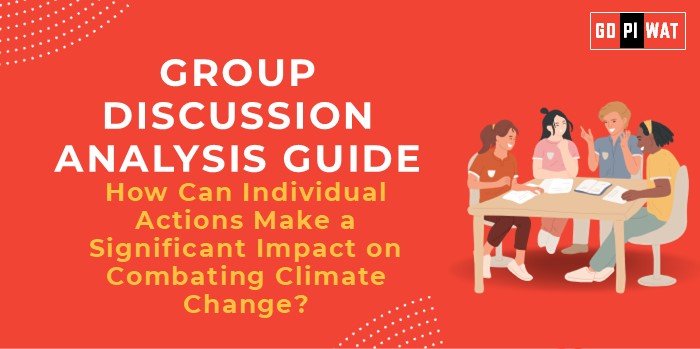📋 Group Discussion (GD) Analysis Guide: How Can Individual Actions Make a Significant Impact on Combating Climate Change?
🌍 Introduction to the Topic
Opening Context: Climate change is a global crisis affecting every facet of life, from rising sea levels to extreme weather events. Individuals, as key stakeholders, hold untapped potential in combating this challenge.
Topic Background: Individual contributions—ranging from reducing energy consumption to adopting sustainable habits—play a crucial role in mitigating climate change. Amidst government initiatives and corporate commitments, individual action complements systemic change by fostering community-level impacts.
📊 Quick Facts and Key Statistics
- 🌍 Carbon Footprint of Households: 40% of global CO₂ emissions are linked to individual consumption patterns.
- 💡 Energy Savings Potential: Residential energy efficiency could reduce global energy demand by 10% by 2030 (IEA, 2023).
- 🍲 Food Waste Impact: Reducing food waste by 50% could lower greenhouse gas emissions by 8-10% annually (FAO).
- 🥦 Adoption of Plant-Based Diets: Transitioning to plant-based eating can cut food-related emissions by 70% (UNEP, 2023).
🌐 Stakeholders and Their Roles
- Individuals: Adopt sustainable habits, participate in community initiatives, and advocate for change.
- Governments: Provide incentives for green choices, implement educational campaigns, and ensure access to sustainable options.
- Corporates: Offer eco-friendly products and services, promote awareness, and reduce their carbon footprint.
- NGOs: Drive grassroots campaigns and provide platforms for individuals to contribute meaningfully.
✅ Achievements and Challenges
🏆 Achievements
- 🌱 Grassroots Movements: Initiatives like “Fridays for Future” show the power of collective individual action.
- 💡 Behavioral Shifts: Rising awareness about renewable energy and reduced single-use plastics.
- 🌍 Community Programs: Local recycling drives and urban gardening projects have increased sustainability.
⚠️ Challenges
- 🛑 Behavioral Resistance: Overcoming habitual practices and lifestyle inertia.
- 💸 Economic Barriers: The affordability of green alternatives.
- 📚 Lack of Awareness: Insufficient understanding of individual impact.
🌍 Global Comparisons
- ✔️ Germany: High adoption of green energy through individual investment in solar panels.
- ♻️ Japan: Nationwide recycling practices driven by individual compliance and government mandates.
📖 Case Studies
- 🇮🇳 India’s Green Champions: Communities adopting solar cookers and water conservation in Rajasthan.
- 🚴♂️ Sweden’s Urban Cycling: Individual preference for bicycles over cars in Stockholm reduced emissions by 50%.
📚 Structured Arguments for Discussion
- Supporting Stance: “Every action counts; small steps by individuals can cumulatively lead to a massive reduction in emissions.”
- Opposing Stance: “Without systemic changes, individual efforts will remain symbolic, lacking measurable impact.”
- Balanced Perspective: “Individual actions drive societal shifts, but must align with robust policies for meaningful change.”
💡 Effective Discussion Approaches
- Opening Approaches:
- Start with data: “40% of emissions come from consumption habits…”
- Pose a thought-provoking question: “Can one person really make a difference in solving climate change?”
- Counter-Argument Handling:
- Counter “symbolic effort” claims with examples of successful collective impact.
- Cite examples where small actions led to broader systemic changes, such as community-led clean energy projects.
📈 Strategic Analysis of Strengths and Weaknesses
- Strengths:
- High potential for immediate implementation.
- Encourages grassroots mobilization.
- Weaknesses:
- Limited scalability without systemic support.
- Risk of complacency overshadowing larger actions.
- Opportunities:
- Increased access to affordable green technologies.
- Collaboration with local governments and NGOs.
- Threats:
- Consumer fatigue from greenwashing.
- Limited impact in under-resourced areas.
🎓 Connecting with B-School Applications
- Real-World Applications:
- Topics in sustainability-driven business practices or green marketing campaigns.
- Sample Interview Questions:
- “How can business leaders empower individual sustainability efforts?”
- “What role should corporates play in supporting climate-friendly consumer choices?”
- Insights for B-School Students:
- Understanding consumer behavior to design impactful sustainability initiatives.
- Leveraging data to measure the success of eco-friendly programs.


